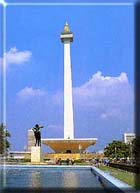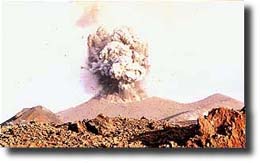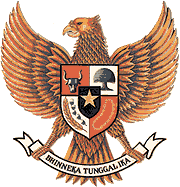The doors are widely opened. International connections are not a problem. Visitors may choose their own routes, their own airlines or might be using their own planes as did some world famous dignitaries coming down to Indonesia.
You may choose – Among other; Bali, the island of Paradise as your gate or through the capital – Jakarta, a metropolitan city with its 8 million inhabitant.

It has all the facilities in accordance with international standard of conveniences and services: hotels, communications, business, travel-connection to all parts of the country and the world. It has modern facilities to cope with growing international demand but it also preserves its local culture proudly, where visitors could enjoy with excitement.
In the near future, in Solo or Surakarta, the existing airport should be developed into an international airport, thus it is believed to be very convenient for foreign visitors wishing to visit directly the magnetic place of tourist attraction : Yogyakarta and Central Java.
INDONESIA, a country lying across between two continents: Asia and Australia and between two oceans namely Pacific in the north and Indian in the south.
Indonesian archipelago is like a string of pearls strew across the tropical seas, consists of 17.508 islands with land surface of more than 5 million square kilometers among other Sumatra, Borneo, Celebes, Irian (western part), the world famous Bali and Java.
The Indonesian people calls proudly its beautiful country, "Tanah Air" (land and water, Indonesia) Its seas are sparkling blue and most part of its land are covered with green color of forest and rice-fields where mountains and over 30 volcanoes mostly active, dominate the country.
 The more famous volcanoes are Krakatau which the world has been shocked by its thunderous explosion in1883, the volcano itself vanished but ongoing eruptions "gave birth" to a new volcano called Anak Krakatau "The child of Krakatau".
The more famous volcanoes are Krakatau which the world has been shocked by its thunderous explosion in1883, the volcano itself vanished but ongoing eruptions "gave birth" to a new volcano called Anak Krakatau "The child of Krakatau".
Galunggung (West Java) The Galunggung with its continuous eruption in 1982 vomiting its debris and ash highly in the sky, blanketing many towns in West Java with thick ash.
Kelud (east Java), Agung (Bali) and Merapi "The fire mountain" in Central Java.
Among the Indonesia's more than 400 volcanoes, more than 30 volcanoes are very dangerous.
But many people lives their entire lives in the slope of volcanoes, whilst the eruption is very perilous to human life, but the lava spitted from its crater give tremendous fertility to the soil.
This country is also called by its people NUSANTARA (Archipelago) is indeed very rich with its mineral resources – oil, charcoal, tin, copper, gold, and has very fertile soil where various crops and vegetables grows abundantly.
The natural climate between 22-34 C or 78-94 F (cooler in the highland of mountainous area), divided to dry season (April – October) and wet season (October – April) where rain comes as tropical downpour, heaviest in January – February.
In these "Islands in the Sun" – Indonesia, live peacefully and harmoniously 200 millions inhabitant.
This country has more than 300 ethnics, speaking in several different dialects and languages. Although the Javanese is the largest ethnic group with about 100 millions people speaking in its own language, but the official language adopted by this nation is Bahasa Indonesia (Indonesian Language) spoken and understood in the whole archipelago. The Basic of Bahasa Indonesia is Malay language and in the development enriched with words derived from other languages such as Javanese, Sundanese as well as from foreign languages such as Arabic, Spanish, Dutch, English etc. Thus become the modern Indonesian language.
The Indonesians enjoy the liberty to practice their belief to God Almighty in accordance with its own religion. The Muslims (majority) live peacefully side by side with communities of Christians, Hindus and Buddhists. Local ancient beliefs, known as KEBATINAN – faith in one Supreme God – also still exist. The government protects the right of freedom of religion, which is enshrined in the state philosophy – PANCASILA.
The free state Indonesia with JAKARTA as the capital proclaimed its independence in August 17, 1945. The state philosophy Pancasila (Five Principles) and Undang-undang Dasar'45 (Constitution'45) which prevail up to now are the backbone of the Indonesian state and unity.
 The Indonesian Coat of Armed
The Indonesian Coat of Armed
Is Garuda (it's a kind of hawk) embracing the philosophy Pancasila and date of independence
It bears the motto "Bhineka Tunggal Ika" – Unity in Diversity. This motto was created by Mpu Prapanca centuries ago.
(Pancasila: 1. Star - Believe in God, 2. Chain - Humanity, 3. Banyan tree - Unity of Indonesia, 4. Bull head - Democracy, 5. Rice & Cotton - Social justice)
The Flag
The flag of Indonesia is red and white. The red is for courage and the white for purity.
Indonesia's Youth Pledge
In October 28, 1928, the youth pledge was announced:
One Country - One Nation - One Language: INDONESIA
Basic Political Structure
Based on the national ideology Pancasila and 1945 Constitution, the repository of people's sovereignty is the People's Consultative Assembly (MPR), which formulates broad outlines of state policy (GBHN) for the government to implement. The MPR elects the president and the vice president for five years term. It has 1000 members, consisting of: all 500 members from the House of Representative the other 500 are professional and regional representatives. The House of Representative: the members are 500. The 425 members are from political parties elected through general election, organized in every five years. The rest, 75 members are from the armed forces. The members of the arm forces they don't vote in general election, but by consensus they are entitled 15% of the seat in the parliament.
The arm-forces in Indonesia consist of: Army, Navy, Police, and Air Forces. The House of Representative draws up the laws and controls the governments' conducts which is headed directly by the president.
Political Parties
In the country, it exists 3 political parties, namely:
- Golkar (Functional Group)
- PPP (United Development Party, muslim dominant)
- PDI (Democratic Party)
Only, these 3 parties are legally taking part in the general election.
Besides political parties they are the mass – organizations and the NGOs (non-government organizations). It is worth to note that all political parties and organizations have to adopt the state ideology Pancasila in its statute.
Started with monetary crisis as from mid 1997, followed soon by crises of confidence, the circumstances have forced President H.M. Soeharto to step down on May 21, 1998. The new appointed President, B.J. Habibie, is assigned to organize a democratic election soonest, with the participation of many new parties. Meanwhile, sufficient supply of basic essential need is a must to avoid chaos.
The reformation in various fields, which is in nature shall be more democratic and transparent, free from malpractices such as corruption and oppressiveness, shall bring the country and the people in better condition of life, politically and economically.
May the just and prosperous society comes true.
Provinces
The country has 27 provinces. In Java they are 5 (five) provinces namely West Java, Central Java, East Java, and Jakarta & Jogyakarta with their special status equal to provinces.
The Economy
According to the constitution, the economic system is based on Pancasila philosophy therefore the people welfare features highly. Article 33 of the constitution stipulates that the economy is administrated as a collective endeavor based on the principle of Fraternity. Earth, water, and all the riches contained therein shall be controlled by the state and utilized for the people's maximum prosperity.
Nowadays, the states as well as the private enterprises are doing actively to boost the economic development. This chorus is also joined by a lot of international companies doing business in Indonesia, such as in industrial investment, trading, banking, mining etc.
The government opens the door for foreign investment, under the coordination of BKPM (National Board of Investment) the Nation is busy welcoming the era of information and globalization with professional measures to cope with. The main goal of the Indonesian people is to build a just and prosperous society based on Pancasila philosophy at home, along side with people of the whole world, who will also hopefully live in happiness and prosperity.
(Suryo S. Negoro)
